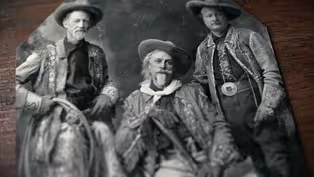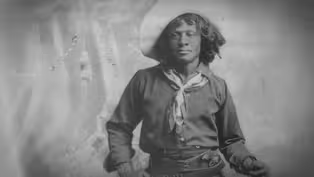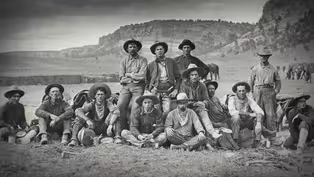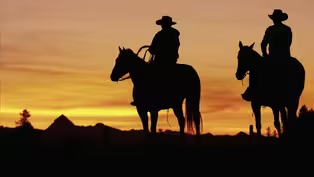
Why Did Cowboy Movies Leave Women Out of the Picture?
Clip: Episode 4 | 1m 55sVideo has Closed Captions
Westerns downplayed the role that women and minorities played in settling The West,
In the 1920s, the rise of a new form of militant white racism had a big impact on the motion picture industry. Consequently, Hollywood Westerns downplayed the significant role that women, Black people and other marginalized groups and minorities played in settling The West, in favor of promoting the mythic image of male-dominant, gun-toting cowboys.
Problems playing video? | Closed Captioning Feedback
Problems playing video? | Closed Captioning Feedback
Iconic America: Our Symbols and Stories with David Rubenstein is a production of Show of Force, DMR Productions, and WETA Washington, D.C. David M. Rubenstein is the host and executive...

Why Did Cowboy Movies Leave Women Out of the Picture?
Clip: Episode 4 | 1m 55sVideo has Closed Captions
In the 1920s, the rise of a new form of militant white racism had a big impact on the motion picture industry. Consequently, Hollywood Westerns downplayed the significant role that women, Black people and other marginalized groups and minorities played in settling The West, in favor of promoting the mythic image of male-dominant, gun-toting cowboys.
Problems playing video? | Closed Captioning Feedback
How to Watch Iconic America
Iconic America is available to stream on pbs.org and the free PBS App, available on iPhone, Apple TV, Android TV, Android smartphones, Amazon Fire TV, Amazon Fire Tablet, Roku, Samsung Smart TV, and Vizio.
Buy Now
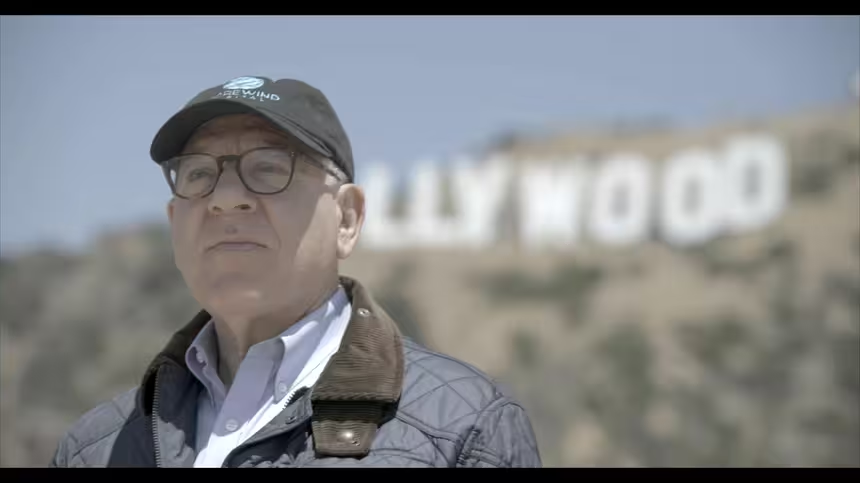
Our Symbols and Stories
David Rubenstein examines the history of America through some of its most iconic symbols, objects and places, in conversation with historical thinkers, community members and other experts. Together, they dive deep into each symbol’s history, using them as a gateway to understanding America’s past and present.Providing Support for PBS.org
Learn Moreabout PBS online sponsorship- Why do you think that the script writers and the movie producers and directors didn't have Black cowboys and Latino cowboys and Native American cowboys?
Why do they only have white cowboys?
- What happened in the years around World War I and the 1920s is this rise of this new dominant, militant white racism.
The rebirth of the Ku Klux Klan in 1915.
The studios realize they're gonna lose money if we have people of color.
You're not gonna see Black people.
Indians tend to just show up as a somewhat faceless enemy.
Hispanic Americans are often portrayed as being devious.
Women are largely, though, not entirely absent.
- [Narrator] I knew that women played a huge role in the Western expansion, not only in homesteading but in cattle ranching.
Why were they left out of the story?
- There was a reaction in the 1920s and the 1930s to women winning the right to vote and there was very much a effort in American society to put American women back in their place in the home.
And by the time, David, that you and I are growing up, you have Dale Evans and Dale is fine, and we all love Dale, but she's also very feminine and a bit demure.
We have to remember that in the Bill Cody era, you've got Annie Oakley.
- Annie Oakley, of course, was a sharp shooter, one of the best, not just of women, but of men and women.
She was the first female superstar in the US.
Of course, she rode.
And the women in these Wild West shows did all sorts of things.
They eventually were riding broncs, they were doing some trick riding.
But so much of our history of the American West is very much this male mythic how the West was won.
And women get entirely dropped from this narrative.
Buffalo Bill Helps Spread the Cowboy Mystique
Video has Closed Captions
Clip: Ep4 | 3m 12s | Wild West Shows led to a skewed perspective of the role of real cowboys in America. (3m 12s)
Video has Closed Captions
Preview: Ep4 | 31s | The cowboy is the quintessential American — fiercely independent, brave and laconic. (31s)
The Homestead Act Spurs Westward Expansion
Video has Closed Captions
Clip: Ep4 | 3m 35s | The Homestead Act attracted thousands of settlers to The West with 160 acres of free land. (3m 35s)
Philip Morris' Marlboro Man Lassoes a Hit Ad Campaign
Video has Closed Captions
Clip: Ep4 | 1m 3s | The appeal and success of the Marlboro Man cigarette ad campaigns spanned decades. (1m 3s)
Providing Support for PBS.org
Learn Moreabout PBS online sponsorshipSupport for PBS provided by:
Iconic America: Our Symbols and Stories with David Rubenstein is a production of Show of Force, DMR Productions, and WETA Washington, D.C. David M. Rubenstein is the host and executive...
